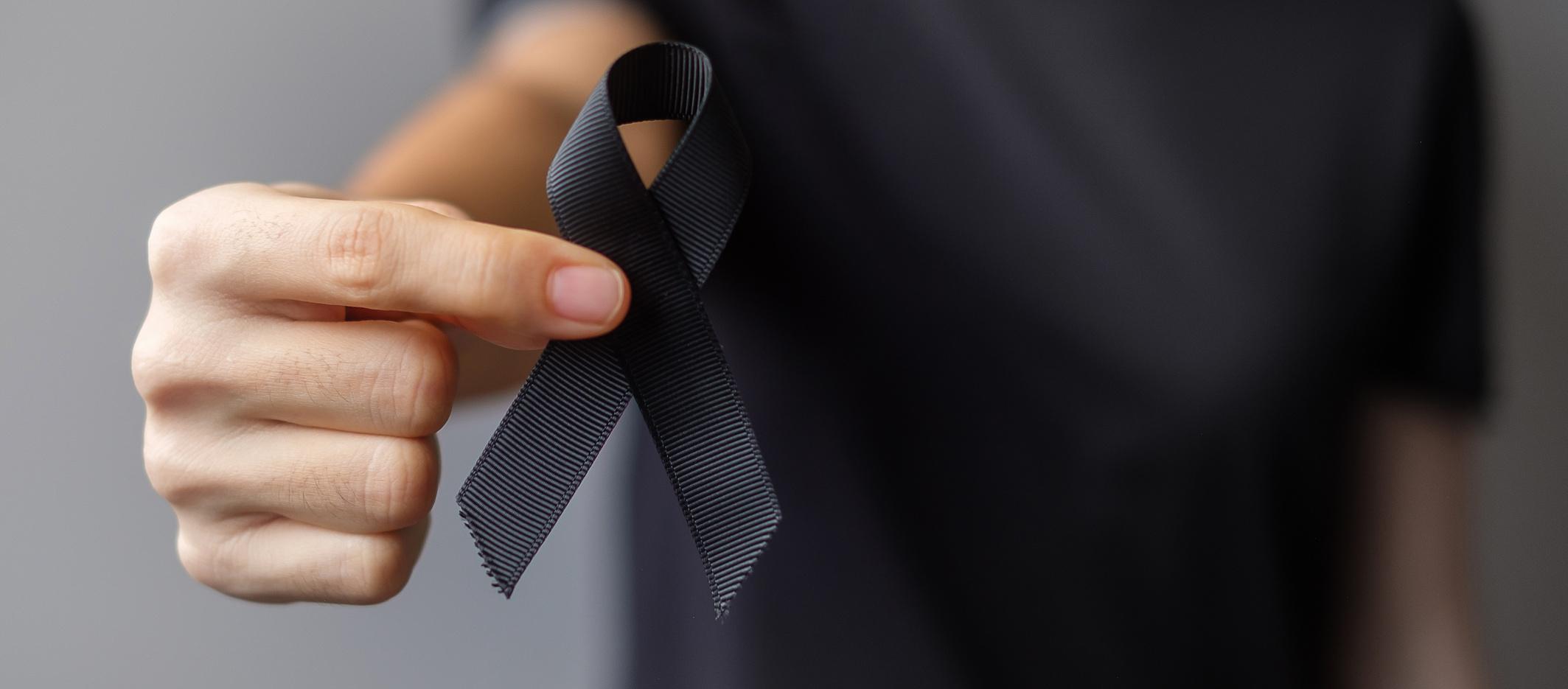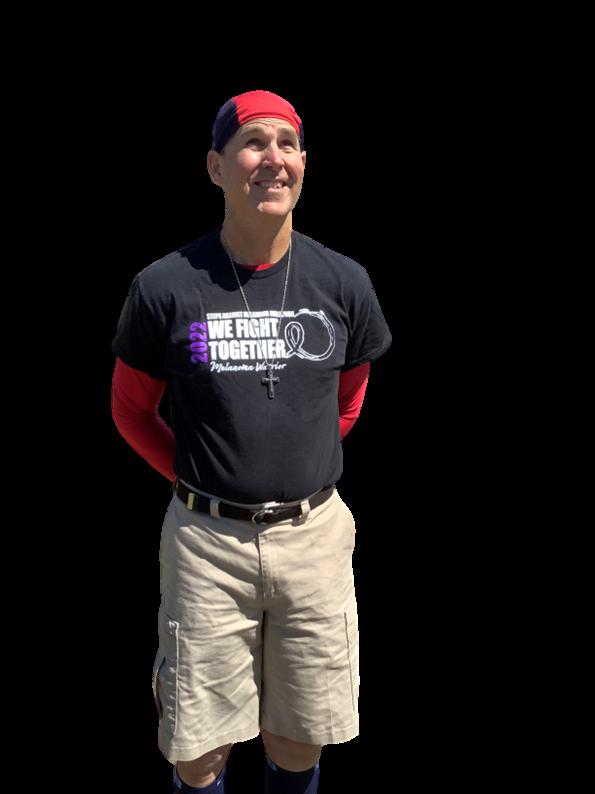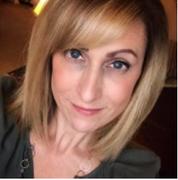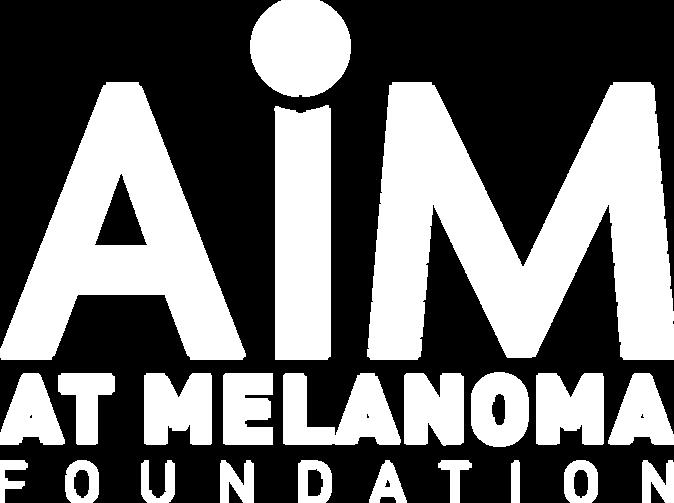CELEBRATING NATIONAL CANCER SURVIVOR MONTH

AIMATMELANOMA.ORG JUNE 2023
During the month of June, AIM at Melanoma and our nation of allies celebrate the nearly 18 million Americans who have bravely and successfully battled cancer, to earn the designation SURVIVOR.
Every June, the country celebrates National Cancer Survivor Month. It is a month for cancer survivors across the country to celebrate their milestones and recognize those who have supported them along the way It is also an opportunity for those not affected by melanoma or other cancers to learn and understand the challenges accompanying survivorship
The National Cancer Institute defines a person as a cancer survivor from the day of their cancer diagnosis onward, for as long as they are alive But many melanoma patients will tell you they did not in any way feel like a survivor the day they learned they had melanoma, and they begin counting after their first cancer-free post-treatment scan.
However you define survivor, this month is a celebration for those who have battled, an inspiration for those recently diagnosed, a gathering of support for families, and an outreach to the community It is also a time to recognize the unique challenges melanoma survivors face, whether physical, emotional, or financial
Each melanoma survivor’s journey is a unique one.The month of June gives us all an opportunity to celebrate their resilience in the face of a serious and challenging diagnosis
Please join us in observing National Cancer Survivor Month Together, we can bring awareness to the critical need for melanoma prevention and early detection, advocacy for those battling the disease, and research to find the cure.

NATIONAL
SURVIVOR MONTH
Intro
CANCER
HEATHER HEAD STAGE IIIB MELANOMA SURVIVOR
survivorship
(ser-VY-ver-ship)
In cancer, survivorship focuses on the health and well-being of a person with cancer from the time of diagnosis until the end of life. This includes the physical, mental, emotional, social, and financial effects of cancer that begin at diagnosis and continue through treatment and beyond. The survivorship experience also includes issues related to follow-up care (including regular health and wellness checkups), late effects of treatment, cancer recurrence, second cancers, and quality of life. Family members, friends, and caregivers are also considered part of the survivorship experience. NCI's

Dictionary of Cancer Terms
Survivor Profile
Meet Cate Sauer
Stage III Melanoma Survivor
Pittsburgh, PA
The summer before her fourth-grade year, Cate Sauer noticed what looked like a skin tag under her chin. After a couple of weeks of trying to cover it up with makeup, Cate’s mom realized it wasn’t going away She took Cate to see a dermatologist, Dr Robin Gehris, who removed the skin tag and biopsied it out of an abundance of caution.
The results came as a shock: melanoma, which she would later learn was Stage III. Cate’s mom delivered the news in the car as she drove her home from a day of swimming at the pool Cate remembers her mother was crying and told her that she could have whatever she wanted. Cate answered immediately and asked if she could get another dog
“I was so young and my mom was more scared than I was,” said Cate, who lives in Pittsburgh “I don’t think I really understood the severity of what was happening until later ”
Even now, when Cate
now a high school senior who will attend Princeton next year – shares her melanoma journey with others, she said she feels like she’s describing it as an outsider
“It was like an out-of-body experience,” she said “I feel like I disassociated a bit because it was so much on my body at once.”

–
After two surgeries to remove the cancer and lymph nodes in her chin, Cate began treatment under the guidance of Dr John Kirkwood For six weeks during her fourthgrade year, Cate left school early so she could receive four to five hours of interferon infusions each evening at Children’s Hospital in Pittsburgh. After that time, she received interferon injections at home three times a week

Her doctors, Dr John Kirkwood and Dr Peter Shaw, hadn’t administered the drug to a child before and weren’t sure about the side effects Cate would experience. The first few rounds were tough, she remembers. She had chills and a fever and had trouble sleeping But her mom helped her treat the symptoms, and though the injections exhausted her, she continued attending school full-time
Her peers took turns staying inside with her for recess – a precaution to protect the port in her arm – and she, along with a child life therapist, Mike Shulock, from the hospital spoke to her class about melanoma and what treatments she would be going through
“We tried to keep everything as normal as possible while we were going through it so as to not add any additional stress or fear,” she said. “But I know that people around me were scared for me. Even though I was weak and my hair thinned out, I really did feel like I knew I was going to get through it ”
The heavier, emotional conversations with her family came years later when Cate was old enough to understand the severity of her diagnosis.
“I didn’t really realize it when I was that age, but when I look back, I realize I could have died ”
Those conversations made Cate much more aware of her body and motivated her to check her skin frequently and take precautions when she’s in the sun
But the biggest lesson, she said, came from recognizing her own resilience and inner strength.
Cate, who stands at 6 feet 1 inch tall, has always been athletic She played basketball, field hockey and lacrosse and is a standout rower who was chosen for Princeton’s team, one of the top Division 1 women’s rowing teams in the country She said she loves the feeling of being on the water, working in unison with her teammates, and she has her sights set on rowing for the U.S. Olympic team.
“Knowing how far I’ve come and everything I’ve done to get here – both athletically and physically – really makes me proud because I did have to work for it,” Cate said.
It took Cate almost two years to rebuild the physical stamina and strength she lost during her melanoma treatment

In her first lacrosse practice after her treatment, Cate remembers heaving after trying to run alongside her teammates
“Just walking left me out of breath and I had to reset my whole body,” she said “The whole experience has made me grateful for everything in my life.”
As she wraps up her senior year of high school, Cate is focused on giving back and continuing to share her story She’s chosen to partner with AIM at Melanoma for her senior project and wants to help fundraise and spread awareness about melanoma and its prevention.
“Being able to still share my story is really important to me because it was such a big event in my life,” Cate said “The fact that people still want to hear about it and still want to learn from it makes me feel really inspired I really want to learn from others’ stories and experiences and have them learn from mine.”

Celebrating Survivors What You Can Do....

One of the most impactful ways to celebrate National Cancer Survivor Month is to share your story.
Every day, people across the world are being diagnosed with melanoma. And every day, new patients seek information about their disease and treatment options
Statistics and data are important they help patients understand their cancer But learning about others’ melanoma journeys can be equally impactful Sharing your story with others can be cathartic for you and reassuring for those who read it.
If you are willing to share your story, please visit our website.

KELLER STAGE IV MELANOMA SURVIVOR
MARTY
MEET JIM ZEOLI
Jim Zeoli had never spent much time thinking about melanoma before his own diagnosis at the end of 2017. But he spent a lot of time thinking about cancer that year. Just 11 months before doctors told him the spot on his arm was Stage III melanoma, he and his wife found out she had sarcoma in her upper back

STAGEIII MELANOMASURVIVOR WESTFORD,MA
“That was just the beginning of our cancer story,” Zeoli said. “We’ve had three bouts with it now – it’s intense, but there’s a certain strength in it, too We’ve always known we were in it together.”

SURVIVOR PROFILE
Christine underwent surgery and radiation, which proved successful; she’s been cancer free since 2017. After her first few appointments, she and Jim came up with a system: Christine would listen to the doctor while Jim would take detailed notes They used the same system but just reversed the roles when Jim began his appointments. The couple saw the same surgical oncologist, who said he’d never treated a husband and wife before
Jim was then referred to a melanoma oncologist, who recommended immunotherapy.


After several months of the treatment, Jim developed neuropathy in his mouth and his doctors recommended that he stop immunotherapy and continue regular follow-up appointments and scans.

Five years later, just after Jim had graduated to six-month follow-ups, he went back to the doctor because of a suspicious spot on his left forearm.
“Given that I’d just moved to checkups every six months, I had felt like ‘This is probably gone.’ Christine was doing well and I was doing well and I thought we were done,” Jim said.
The spot turned out to be melanoma again, this time Stage II. Still, Jim said he still felt a sense of confidence and hope.
“I thought ‘We’ve been through this before and we can do it again,’” he said. “We knew the drill and we knew that life continues on after a diagnosis.”
Jim had surgery to remove the melanoma and one lymph node and on the recommendation of his oncologist opted not to try immunotherapy again. He stays committed to keeping his follow-up appointments and scans, even though he gets quite claustrophobic in the MRI machine.
That’s one piece of advice he gives anyone facing melanoma: Keep all of your appointments. “Don’t skip them, don’t put them off; they are what helps you stay ahead of anything and if you stay ahead of it, you have the best opportunity to do something about a recurrence ” Jim also advises patients to have a friend or family member take notes during appointments and recommends keeping a journal to note any side effects from treatments. He also continues a practice of taking frequent photos of the spots on his skin to monitor any changes.
While recurrence is a possibility, Jim says he doesn’t want to live in fear. Instead, he chooses to focus on what he can control.
“You can’t ruin today or tomorrow worrying about something you can’t do anything about,” he said. “Make today as good as it can be because you’re here and you can go be with people and go do things you enjoy.”
Jim said his Catholic faith and the support of friends and family, including his five grown children, helped him and Christine stay positive as they faced the three rounds of cancer. He rarely went to appointments alone – if Christine wasn’t there, one of his children, coworkers or friends usually was.
It’s important that cancer patients stay open to accepting that help and care from others, Jim said.
“Don’t block people out who want to support you,” he said. “Try not to withdraw into the cancer and let it take over everything about your life.”
In doing so, it’s also important to stay transparent with loved ones, Jim said. As a husband and a father, he said it was important to be strong while also staying honest and letting himself be vulnerable.

“You don’t need to internalize it all and be some macho kind of guy,” he said.
Even while getting treatment, Jim said he made a point to look around and notice the love and kindness in the room.
“There are the nurses and the assistants, the volunteers and the person who comes around with the snack cart All of those people are amazing,” he said. “When you see the world in that light – noticing the good stuff even amid the bad – that’s when you can see what life is all about.”

K E E P A L L O F Y O U R A P P O I N T M E N T S . “ D O N ’ T

S K I P T H E M , D O N ’ T P U T
T H E M O F F ; T H E Y A R E W H A T
H E L P S Y O U S T A Y A H E A D O F A N Y T H I N G A N D I F Y O U
S T A Y A H E A D O F I T , Y O U
H A V E T H E B E S T
O P P O R T U N I T Y T O D O
S O M E T H I N G A B O U T A R E C U R R E N C E . ”
WORDS BY JIM ZEOLI

Survivor Profile Meet Reva Foy
Stage IIIC BRAF+
Nodular Melanoma Survivor
Fredericktown, OH
At first, Reva Foy assumed the open wound on her right foot could be attributed to a pair of ill-fitting shoes But finally, after realizing it wasn’t healing, she saw a podiatrist.

“He took one look and said, ‘I think it’s melanoma,’” Reva remembers about that day in late 2012
Having spent her career as a medical practice administrator who worked with plastic surgeons, she thought back to the melanoma patients she’d met decades ago when there were fewer treatment options than today. “I was horrified,” she said.
A biopsy confirmed the podiatrist’s suspicion: It was indeed cancer
Reva was diagnosed with Stage IIIC BRAF+ nodular melanoma. Then, two weeks later, while staging, Reva’s doctors discovered she also had breast cancer


“It was a pretty tumultuous year,” Reva said But it was also the beginning of a now decadelong journey that Reva says taught her the importance of gratitude and of staying present.
Even back then, Reva felt it wouldn’t help her to obsess over survival rates; instead, she wanted to focus her mindset on her three children
Her youngest was a year away from 18, and she prayed that she’d live long enough to see her daughter reach adulthood.
“I not only got to see that, but I got to see her become a nurse,” Reva said “I got to dance with my son at his wedding and become a grandmother – all blessings far beyond what I asked for then ”
Reva feels lucky to have had such a sustained response to her targeted therapy treatment –she’s been taking Zelboraf since early 2013 She had a wide local excision and groin node dissection in May 2013 And that fall, she underwent a lumpectomy to remove the tumor in her breast and a wide local excision to remove another melanoma spot on her back.
“I got to dance with my son at his wedding and become a grandmother – all blessings far beyond what I asked for then.”
“Every breath is a gift. It makes you really grateful for the little things and sometimes even a little intolerant of pettiness. There’s just so much to be thankful for.”
While Zelboraf has caused fatigue and photosensitivity that makes Reva very susceptible to sunburn, she chooses to focus on the time it's given her
“Every breath is a gift,” she said “It makes you really grateful for the little things and sometimes even a little intolerant of pettiness There’s just so much to be thankful for ”
Reva now lives on an acreage in Ohio with dogs, horses, goats and chickens Normally a private person, she’s determined to keep sharing her story to spread awareness and hope
Her advice to those facing a melanoma diagnosis: Seek out that hope. Find a doctor you trust, join support groups online and participate in fundraising walks to meet other survivors (Reva was this year’s honoree at the Dallas Steps Against Melanoma Walk in May and she was a board member for Walk with a Doc for 15 years ) She also tells patients to make sure they are reading only the most upto-date research about treatment options.
“Whenever someone says they’re newly diagnosed, I give them the link to AIM at Melanoma because so much of the other information on Google is outdated and doesn’t offer as much hope,” she said
Reva hangs onto her positive mindset as she celebrates ten years of survivorship and reflects on the perspective that her melanoma journey has given her.

"I’m incredibly lucky. I need to continue to make sure that every day I wake up, I live the best life I can."





Things to Buy Every order helps raise critical funds in our fight to end melanoma Melanoma Warrior Believe There's Hope 01 02 the essentials It'sNot"Just" SkinCancer 03 04 Hope Love Cure
Keith Tolley Stage IV Melanoma Survivor
"Over the past few years, I've had the privilege of connecting with hundreds of melanoma patients, at different stages of their cancer journey, helping them navigate the difficulties, the uncertainties, and the challenges that come while living with cancer



It has been and continues to be, incredibly rewarding helping other patients in this way."
Ruth White Stage IA Melanoma Survivor
"After my first melanoma diagnosis, I discovered I had great inner power to help myself and others. I used life coaching and exercise to help me cope. That positive energy helped me surround myself with a tribe of people I needed in my life to survive. I am adamant that without it, my mental health would have gone in the wrong direction.
Not much attention is given to the terrible anxiety that early-stage cancer survivors suffer; I hope to share my story with them to help them know they are NOT alone. Hope leads to faith in your power within."

AnnMarie Stage IIB Melanoma Survivor
“Even though I’m two years out and NED, melanoma is something I think about every day. Actively staying involved in the solutions (like the clinical trials and keeping up on the webinars) is about being armed. It makes me feel like if this comes back, I will have the best shot at surviving it because I’ve been educating myself.”
"One of the topics that often comes up is how hard it is to explain the diagnosis to others, who associate the word “melanoma” with a mole on the skin It’s so important to get this information out there Cancer is cancer and pain is pain I just want people to be aware of mucosal melanoma and have patients know there are some answers and support."


"I’m three years out, and the things I’ve learned are: cancer sucks, fears are real and debilitating, life happens no matter what, most people are loving and kind, and giving of yourself is the best gift you can give "


 Bev Johnson Mucosal Melanoma Survivor
Bev Johnson Mucosal Melanoma Survivor
“All the things I thought were a big deal are just not a big deal anymore. Things that would stress you out – I don’t see them that way anymore ”
Carrie
Jeffries
Stage IA Melanoma Survivor
“I’ve always considered it important to take advantage of knowledge, to learn as much as I could Collaboration certainly has been a mainstay of my response to melanoma ”
Tom
Lauritzen
Stage III Melanoma Survivor
Victoria Simiola Acral Melanoma Survivor
LATEST EPISODE
People living with melanoma often benefit from practical help and advice from others who have lived through similar situations Support groups bring people together and provide a safe forum for exchanging perspectives, sharing concerns, and gaining confidence to face the future.
Of course, each of us has to find a way of dealing with a melanoma cancer diagnosis. None will take us back to where we were before, but the key is finding the one that lets you live the best, most positive life today and tomorrow.
In this episode, two melanoma survivors who serve as volunteer mentors in AIM's Peer Connect program talk about finding meaning and empowerment while helping others.


PAY IT FORWARD BECOME A MENTOR
As a survivor or caregiver, you know better than anyone else what it is like to go through treatment, how to deal with side effects, and how to manage all the emotions—highs and lows that come with a melanoma diagnosis.
Share your experience and expertise by volunteering as a Peer Connect mentor to another survivor or caregiver. To become a volunteer peer mentor, you must have completed your melanoma treatment at least six months prior to participation.


PEER CONNECT
WE’VE WALKED IN YOUR SHOES
If you have recently been diagnosed with melanoma, you may be experiencing a wide range of feelings and emotions. Our goal is to provide support to help ease the anxieties, stresses, and fears that may arise during your melanoma journey.
In this program, you are matched with a trained volunteer peer mentor who has “walked in your shoes” as a melanoma patient — ideally, someone diagnosed with the same stage of melanoma. The peer mentor provides one-on-one support, a listening ear, and guidance in a safe, non-judgmental, and confidential environment.

































 Bev Johnson Mucosal Melanoma Survivor
Bev Johnson Mucosal Melanoma Survivor




